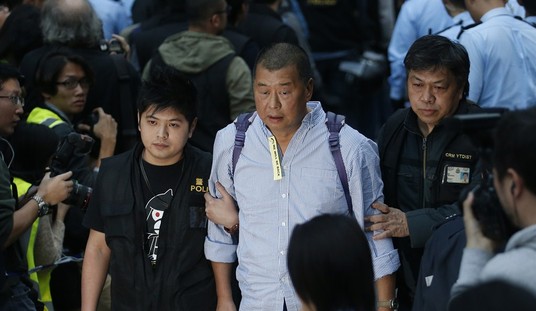Last week, Donald Trump announced that China had already agreed to terms on a a first-step trade deal with the US. According to Bloomberg, either Trump spoke prematurely or Xi Jinping has tried to play games once again. China won’t sign the “phase one” deal without more negotiations, Bloomberg reports this morning, leaving the status of talks unclear:
China wants further talks as soon as the end of October to hammer out the details of the “phase one” trade deal touted by Donald Trump before Xi Jinping agrees to sign it, according to people familiar with the matter.
Beijing may send a delegation led by Vice Premier Liu He, China’s top negotiator, to finalize a written deal that could be signed by the presidents at the Asia-Pacific Economic Cooperation summit next month in Chile, one of the people said. Another person said China wants Trump to also scrap a planned tariff hike in December in addition to the hike scheduled for this week, something the administration hasn’t yet endorsed. The people asked not to be named discussing the private negotiations.
The details of the verbal agreement reached in Washington last week between the two nations remain unclear. While Trump hailed an increase in agricultural purchases as “the greatest and biggest deal ever made for our Great Patriot Farmers in the history of our Country,” China’s state-run media only said the two sides “agreed to make joint efforts toward eventually reaching an agreement.”
This looks similar to the chain of events that led to rapid-fire tariff hikes between the two nations. At one point, Trump thought he had an agreement with China to reset trade and intellectual-property policies, only to have Xi yank the rug out from underneath him by withdrawing almost all of the concessions. At the time, it was thought that Xi wanted to take Trump’s measure and got surprised when Trump immediately escalated the fight.
Perhaps the amount of surprise might have been overstated at the time. If Xi tried making the same play over the weekend, he won’t have any right to claim surprise over what might come next, as Jonathan Swan points out:
If what Bloomberg is reporting becomes Beijing’s position — and narrative becomes that Chinese played Trump — trade war will likely resume with extra @realDonaldTrump determination to screw them. https://t.co/5XvdqcwFSL
— Jonathan Swan (@jonathanvswan) October 14, 2019
But was this a deal at all, or did Trump overstate progress as an actual breakthrough? For China, the phasing Trump offered presents internal problems for Xi. While China has offered separate deals in areas of trade, it wants all of the punitive tariffs lifted first:
For Xi, it’s seen as politically unfeasible to accept a final deal that doesn’t remove the punitive tariffs altogether. Nationalists in the Communist Party have pressured him to avoid signing an “unequal treaty” reminiscent of those China signed with colonial powers.
“The U.S. must concede on its December tariff threat if they want sign a deal during APEC summit, otherwise it would be a humiliating treaty for China,” said Huo Jianguo, a former Chinese commerce ministry official who is now vice chairman of the China Society For World Trade Organization Studies. “The U.S. has definitely shown some good gestures but we shouldn’t exclude the possibility of another flip-flop.”
That might have been why the Chinese didn’t talk up the prospects of this deal right from the get-go. Their state media apparently never mentioned that a deal had been reached, and even warned the US about getting over its skis, as well as Trump using any potential misunderstanding to escalate the trade war:
Chinese state media warned the U.S. over the weekend to “avoid backpedaling” on the partial trade agreement, and expressed caution about the initial phase of the deal which President Donald Trump called “very substantial.” …
“While the negotiations do appear to have produced a fundamental understanding on the key issues and the broader benefits of friendly relations, the Champagne should probably be kept on ice, at least until the two presidents put pen to paper,” said China Daily on Sunday. …
“As based on its past practice, there is always the possibility that Washington may decide to cancel the deal if it thinks that doing so will better serve its interests,” China Daily said.
“The US should avoid backpedaling, as it has in the past, and instead cherish what has been achieved as a manifestation of a healthy and steady China-US relationship that serves the interests of both countries and the world,” it said.
Xinhua also never claimed that a deal had been struck:
Xinhua report says the two sides made “substantial progress,” but does not say a deal was reached. If both sides don’t think there is a deal, there’s no deal. https://t.co/UihEqcrMmU
— Scott Kennedy (@KennedyCSIS) October 11, 2019
And investors in the West didn’t see it as a deal, either:
Wall Street analysts were largely skeptical of Trump’s announcement on Friday of a substantial trade deal, as Evercore ISI strategists noted that it “focused on the low-hanging fruit, with a lot vague or not addressed.” …
China’s trade negotiators want to meet for more talks in the next couple of weeks, people familiar with the matter told CNBC’s Kayla Tausche on Monday. Before Chinese President Xi Jinping signs the “phase one” trad agreement, the nation’s negotiators want to add more detail.
Credit Suisse doubts this “mini-deal” will lead to the end of the U.S. trade war with China, saying it sees “daunting obstacles” to a full resolution. But Credit Suisse does see some good news in the early agreement.
So perhaps Xi doesn’t want to sign the “phase one” accord because there’s nothing yet to sign. Neverthless, Trump spent yesterday promoting the agreement and claimed that China had already begun purchasing “very large quantities” of agricultural products from “OUR GREAT PATRIOT FARMERS & RANCHERS”:
https://twitter.com/realDonaldTrump/status/1183499482790612993
https://twitter.com/realDonaldTrump/status/1183500215241859073
It sounds like both Trump and China are playing wheels-within-wheels games in these negotiations. Nothing is certain until pen meets paper, and even then, China has shown an amazing amount of, er, flexibility when it comes to meeting the terms of international agreements.







Join the conversation as a VIP Member